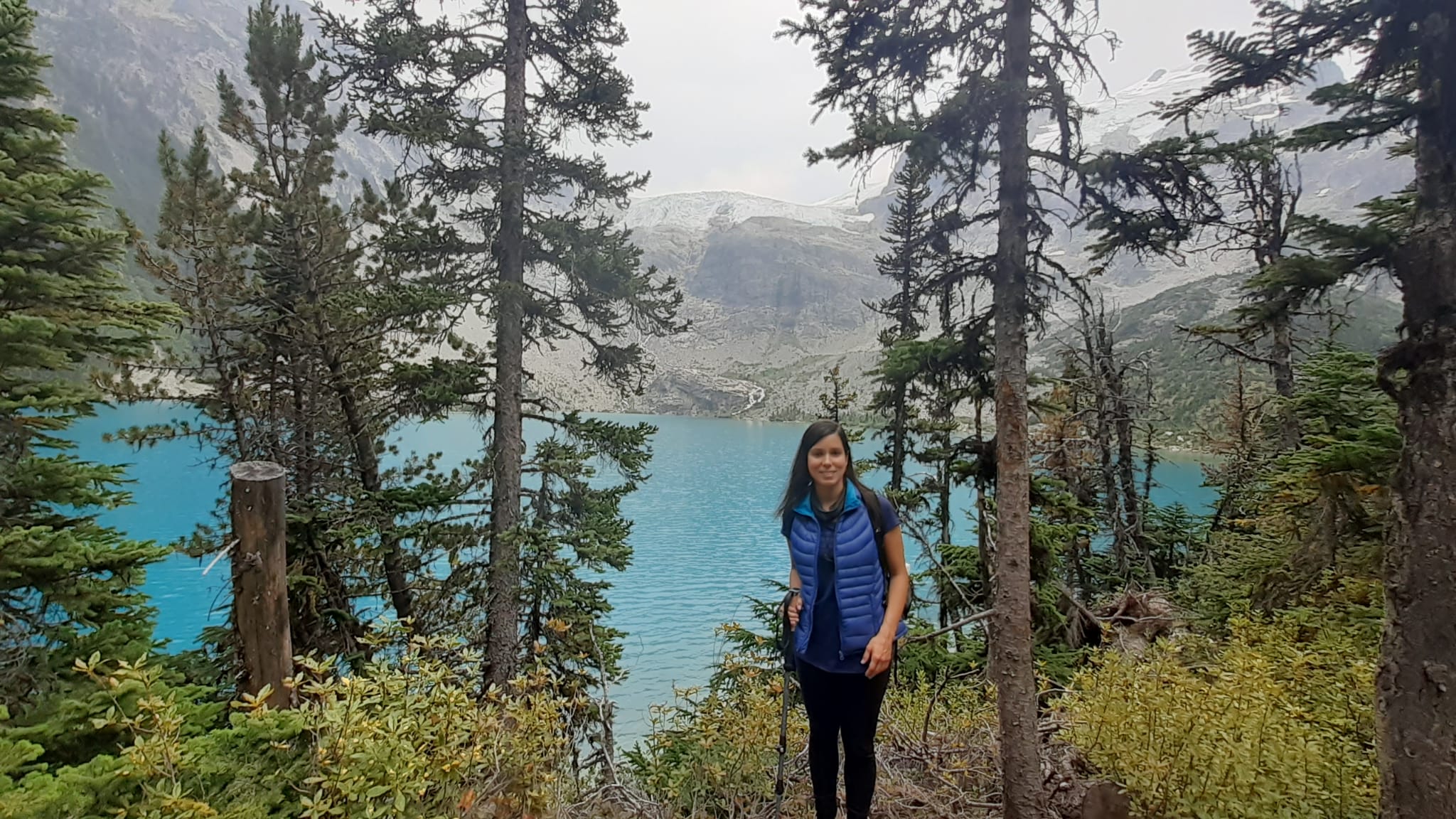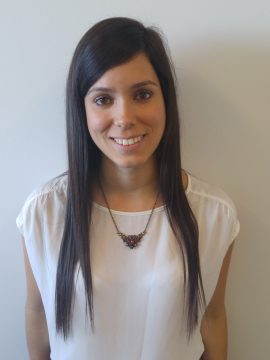Romina Tantalean-Castaneda
Being a public scholar entails ethical and political responsibilities to be consistent with the people and communities you are collaborating with; to respond and be attuned to their priorities, agendas, and distinct needs and desired futures for their direct benefit in a respectful, meaningful, and reciprocal manner; and to be in service for the public good.
Research description
Informed by various critical Indigenous and anti-colonial works and feminist participatory action research, my dissertation centers on an intercultural action-oriented and collaborative research process with the Amazonian Indigenous women's federation of Atalaya Province (FEMIPA) in the context of extractivism, eco-territorial conflicts, and climate environmental-related injustices in the Amazon, while centering and prioritizing Indigenous ontologies and knowledges, and co-mobilizing "the Rights of Mother Nature." FEMIPA, a grassroots federation, represents women from six nations in the Atalaya Province in the Peruvian central east Amazon.
The questions that inform my doctoral research began through my experiences as a human rights lawyer in Peru. My work, advocating for and overseeing Indigenous women's and women's rights, helped develop my political awareness of a State-led imposed extractivist model on Indigenous territories, with distinct implications for Indigenous women. This research study emerges within this context, specifically from the Federation of Amazonian Indigenous Women of Atalaya Province's (FEMIPA, the acronym in Spanish for "Federación de Mujeres Indígenas de la Provincia de Atalaya") grassroots work and struggles for their territorial rights and forests. Thus, this project is guided by Indigenous women's leadership, who are leading the fight for the legal recognition of the rights of Mother Nature in Peru. By aspiring to conduct decolonial research, this project is part of the first intercultural collaborative endeavors with Amazonian Indigenous women resisting in defense of their territorial rights and forests, centering and prioritizing women's leadership, knowledges, voices, and context. To this end, a preliminary agreement was signed between FEMIPA and the principal researcher (myself) to co-conduct this project and access Indigenous territories following Amazonian protocols —FEMIPA will determine the specific collaborating communities. Guided by Amazonian Indigenous women's leadership, our work centers on the following critical points: 1) Indigenous leadership challenging and resisting historical and recent forms of systemic violence against their bodies, forests, and ancestral territories, with particular attention to Peru's extractivist development model, and 2) Possibilities for, and constraints to, creating and implementing the rights of Mother Nature from a strongly pluralist legal paradigm. In the long run, our work seeks to generate an academic, socio-political and legal impact through the following: First, it will inform and contribute to the creation and implementation of the rights of Mother Nature from a strongly pluralist legal paradigm grounded in Indigenous onto-epistemologies. Second, it will bridge the gap between the academy, territorial struggles, and activism to defend the centrality of life and the Earth. Finally, it will co-produce the proposed project and co-mobilize knowledge and findings concerning the rights of Mother Nature with specific recommendations to the Peruvian State (e.g., governmental and legal officials) and non-profit sector (e.g., NGO/grassroots organizations) and communication tools.
What does being a Public Scholar mean?
From my perspective, being a public scholar entails ethical and political responsibilities to be consistent with the people and communities you are collaborating with; to respond and be attuned to their priorities, agendas, and distinct needs and desired futures for their direct benefit in a respectful, meaningful, and reciprocal manner; and to be in service for the public good. In particular, action-oriented and collaborative research as a public scholar involves a crucial shared responsibility with strong critical and affective sensibilities and intellectual and relational capacities to support, advocate, and collaborate with research partners and communities. Inspired by various Indigenous, decolonial and anti-colonial works, my ethical position and political labor in thought, action, and affection in research, writing, and advocacy with FEMIPA, a federation led by Amazonian Indigenous women, are thus rooted in the political responsibility to be a comrade to Indigenous peoples, particularly to Indigenous women's leadership in their struggles and resistances for self-determined futures, while de-centering myself throughout the research project. As a PSI scholar, I am thus committed to an ongoing ethical praxis of cultural humility, flexibility, hyper self-reflexivity, and relational accountability throughout the research process, re-shaping, revisiting, re-examining, and redefining it in a non-linear direction by sharing power with research partners. I feel very honored to be part of the PSI network with inspiring and outstanding doctoral students who are deeply committed to non-traditional and innovative forms of scholarship beyond the academy for societal transformations locally, nationally, and globally.
In what ways do you think the PhD experience can be re-imagined with this Initiative?
The PSI support will enable our intercultural collaborative research to be genuinely action-oriented and bottom-up while re-imagining the doctoral program for meaningful social impact. Notably, our research seeks to contribute empirically to the scholarship concerned with these topics, including the literature on Indigenous-State relations, Indigenous resistances, intersectional feminist struggles, legal pluralism, and political ontologies in Latin America, by bridging the gap between the academy, territorial struggles, and activism in defense of life and Mother Earth. Methodologically, I plan to co-develop and operationalize culturally, contextually, and place-based sensitive qualitative mixed methods with my research partners, grounded by a strong sense of accountability, responsibility, humility, and integrity, paying extreme attention, caring, and respecting others. I consider the Public Scholar Initiative to genuinely allow ethically bottom-up and action-oriented research so that doctoral students can challenge and disrupt historical and present-day colonial and extractivist logics of epistemic violence against marginalized populations. Desiring to become a public scholar and intellectual-activist, my aspiration for weaving together with Amazonian Indigenous peoples is bound up with the urgency to collectively imagine, dream and reach beyond the global dominant euro-western paradigm of capitalist, extractivist, and heteropatriarchal exploitation, given our collective entanglements, immersion, and different implications in times of intensifying social and ecological global crises. Guided by Asheninka women's leadership, our work intends to weave these critical questions by centering Amazonian Indigenous women's knowledges, voices, and context as a way of gesturing towards healthier, respectful, and decolonial ways of co-existence between all living beings —human, non-human, more-than-human, other-than-human— in resonance with life and Mother Earth. I believe the PSI initiative genuinely supports innovative scholarly work from doctoral students aiming to co-create and co-produce knowledge with communities, grassroots organizations, and systemically excluded populations.
How do you envision connecting your PhD work with broader career possibilities?
As a lawyer centering on the defense of human rights, Indigenous territorial resistances, and intersectional feminist struggles, I envision my PhD work to deepen and expand my professional, research, and academic background so as to continue building and cultivating bridges and alliances with communities and organizations for social transformations in Latin America, specifically in a country with many complexities, such as Peru. I consider my doctoral research pivotal in my professional and scholarly career, gaining the critical theoretical, analytical, and methodological tools to move toward strongly pluricultural legal paradigms locally, nationally, regionally, and transnationally. Aspiring to become a public scholar and intellectual-activist, my PhD will thus allow me to acquire the expertise to work professionally as a defender of human and Mother nature rights with grassroots communities across the Latin American region and worldwide in resonance with life and Indigenous peoples' self-determination and sovereignty.
How does your research engage with the larger community and social partners?
In Peru, Indigenous women have been disproportionally impacted in the last twenty years by a violent development model —of capitalist, neo-colonial, and heteropatriarchal lines— imposed on their territories, with real implications for their bodies, children, lands, and forests. As a result, women are particularly exposed to structural violence against their bodies and forests. Indigenous feminist leadership has emerged, nourished, and strengthened in the last decades, gaining prominence as visible actors at the forefront of resistances, struggles, and confrontation in the form of keepers, protectors, and defenders of their lands. Responding to these complexities, my research partner is the Amazonian Indigenous women's federation of Atalaya Province (FEMIPA), whose work has centered on building, training, and strengthening the leadership capacities of Ashéninka, Asháninka, Yine, Yaminahua, Shipibo-conibo, and Quechuas women across the province through grassroots working methods of collective action in the communities. Through the PSI fellowship, my doctoral research with FEMIPA aims to generate a socio-political and legal impact on the rights of Mother Nature in Peru by centering Indigenous women's leadership, who leads the emerging movement for the rights of Mother Nature, in order to legally recognize ecosystems and natural entities with legal personhood as living entities, and to defend Indigenous self-determination over their lands and forests, moving towards strongly pluricultural legal orders in Peru.
Why did you decide to pursue a graduate degree?
My work as a legal/policy specialist and advisor in human rights, gender equity/equality, and gendered violence, including advocacy and oversight of Indigenous peoples' rights and giving advice to grassroots and local organizations, led me to pursue a graduate degree. I was deeply interested in critically examining and addressing larger systems of inequalities deeply rooted in capitalist, colonial, gendered, and racialized power structures that have shaped the Peruvian State's policies, legislation, and practices.
Why did you choose to come to British Columbia and study at UBC?
I came to UBC as a master's student and am now a doctoral student because I consider the Social Justice Institute's (Gender, Race, Sexuality, and Social Justice) interdisciplinary doctoral program the most suitable environment for re-imagining and advancing my graduate goals. It provides specific critical theoretical, analytical, and methodological frameworks needed to thrive in my academic goals for innovative scholarly work so as to merge theory with praxis for meaningful societal transformations.






